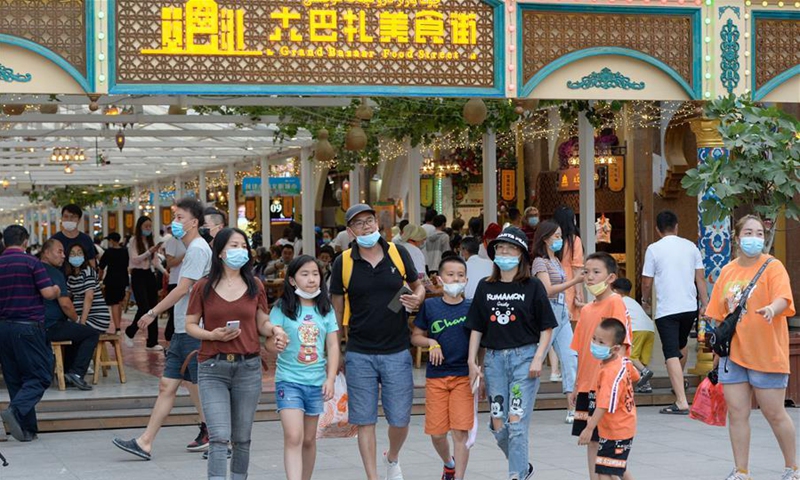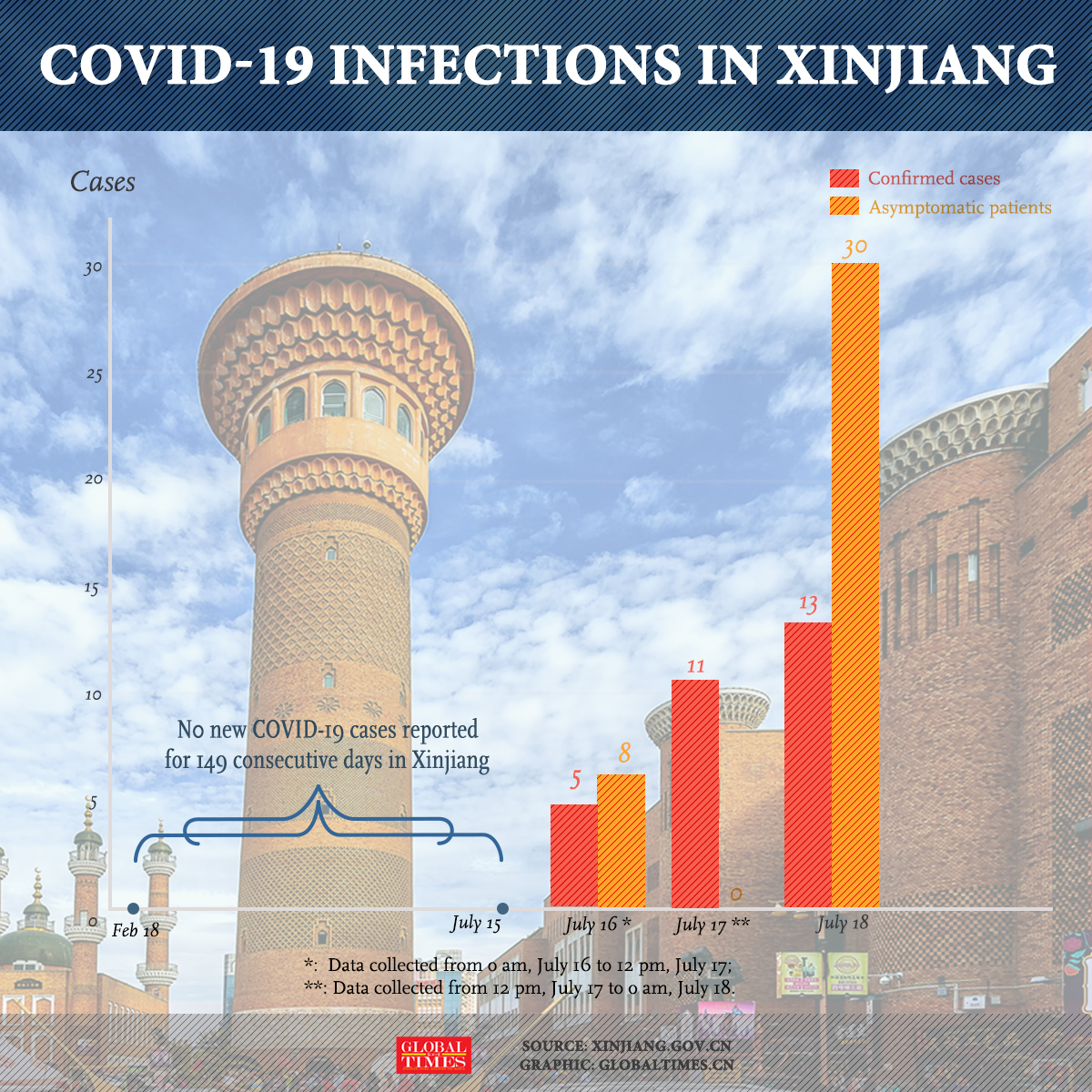Urumqi infections traced back to a wedding: doctor
By Liu Caiyu Source: Global Times Published: 2020/7/19 11:15:45
Xinjiang's capital may return to normal life in three or four weeks: expert

Tourists visit the Grand Bazaar Food Street in Urumqi, capital of northwest China's Xinjiang Uygur Autonomous Region, July 4, 2020. (Xinhua/Ding Lei)
While Urumqi, capital of Northwest China's Xinjiang Uygur Autonomous Region, presses the "pause button" as the city entered a "wartime mode" amid rising COVID-19 infections, Chinese experts said Sunday that the outbreak there is controllable and the city expects to return to normal life in three or four weeks.
Most of the new infections have been traced to a wedding party held in early July, a medical expert who is close to the matter told the Global Times on Sunday, but the actual origin of the cluster of infections is still unknown. Experts said the possibility that it is related to imported cases cannot be ruled out.
On Sunday, Urumqi raised the COVID-19 risk level of two districts, Tianshan and Saybagh districts in the city, to the highest, local authorities announced.
Urumqi found 13 new confirmed cases and 18 asymptomatic infections on Saturday, the latest report from the Xinjiang regional health commission said Sunday. All are under medical observation.
As of Saturday, Xinjiang reported a total of 30 confirmed COVID-19 cases and 41 asymptomatic infections, all of whom are from Urumqi. There are 2,705 people under observation.
COVID-19 testing institutions in Urumqi are working at full capacity as the city expands nucleic acid testing in order to detect infected people. Many institutes are working around the clock.
The First Affiliated Hospital of Xinjiang Medical University, one of the 25 institutes able to conduct tests for COVID-19 in the city, increased their daily capacity to 8,000 from 4,000, the Global Times learnt on Sunday.
A private testing center in Urumqi also told the Global Times on Sunday that they are stepping up their testing capability by deploying large amounts of testing equipment to the center enabling them to process between 20,000 and 30,000 tests a day.
"We are preparing for citywide COVID-19 tests. Now we're mainly testing people that the government has directed us to, but the testing scope is expected to expand later," a staff member at the center said, declining to give his name.
According to local health authorities, from July 17, Urumqi started testing key groups from neighborhoods where positive tests were confirmed, suspected and asymptomatic cases and their close contacts, as well as those displaying fever symptoms. The second round of tests will cover other communities and people in public-sector work units. As an auxiliary examination, the city will also adopt batch testing which mixes five samples in a single test.

Home to more than 3.5 million people, Urumqi has entered a "wartime mode" with all local residential communities put under "sealed-off management," while all gatherings have been banned.
This outbreak is linked to a group activity and those who contracted the disease are mainly in the Tianshan district of Urumqi. All of them are under medical observation, local Urumqi Center for Disease Control and Prevention (CDC) said on Saturday.
Zhang Yuexin, director of the infectious disease department of the First Affiliated Hospital of Xinjiang Medical University and also a medical expert involved in the Urumqi anti-epidemic group, told the Global Times on Sunday that basically all the COVID-19 cases in the city can be traced to a wedding in early July.
The first confirmed case in Urumqi is a woman working in Zhongquan Square who was confirmed to have contracted COVID-19 on July 15. Later most cases found in the city had some connection to a wedding the woman attended in early July, according to Zhang, but he declined to reveal more details.
Zhang Yuexin said border ports in Xinjiang had been guarded strictly, and the possibility that transmission through these ports is low, but he believes it may have something to do with people returning from overseas.
Some people returning to China who have been quarantined for 14 days in cities such as Chengdu, Shanghai or Lanzhou came back to Xinjiang eventually. The patient zero might be among them who became infectious after the 14-day incubation period and infected others in Urumqi, Zhang said.
Urumqi has requested the National Health Commission to coordinate with the novel coronavirus gene sequencing analysis of the confirmed case to clarify the source and transmission route of the virus.
Zhang Wenhong, the outspoken Shanghai-based infectious disease expert, posted on Sina Weibo on Saturday that Urumqi is expected to return to normality after three to four weeks.
Zhang Wenhong said this is the result of a swift response, precise anti-epidemic measures and the resolution of clear new confirmed cases.
The presence of regional small-scale cluster infections is normal, but once there is an outbreak, just as the Beijing municipal government did, Xinjiang regional government acted swiftly, launched mass testing and screening and tracked all related people through epidemiological investigations, said Zhang Wenhong.
Behind this proactive, rapid and precise prevention and control is the determination of the Chinese government to "continue to approach zero cases," he said.
Authorities in Xinjiang have launched an emergency response plan and have carried out a full epidemiological investigation to trace transmission paths to make sure no one has been missed.
Nearly 90 percent of flights in and out of Urumqi were canceled on Friday after the new COVID-19 cases were reported. To improve the city's nucleic acid testing capacity, the National Health Commission arranged for 10 nucleic acid testing teams in 10 provinces and cities to go to Urumqi, made up of more than 200 people.
Reports said the teams will be dispatched to different testing institutes in need of assistance to help them expand testing capacity. For example, 21 laboratory technicians from Wuhan, Hubei Province were dispatched to support the Fifth Affiliated Hospital of Xinjiang Medical University.
Zhang Wenhong said that although there would continue to be sporadic infections, China has never stopped its quest to find the best solution. China's method of clearing new cases by expanding the number of tests could serve as a contribution to the international community as it seeks to find solutions to the crisis.
Posted in: SOCIETY